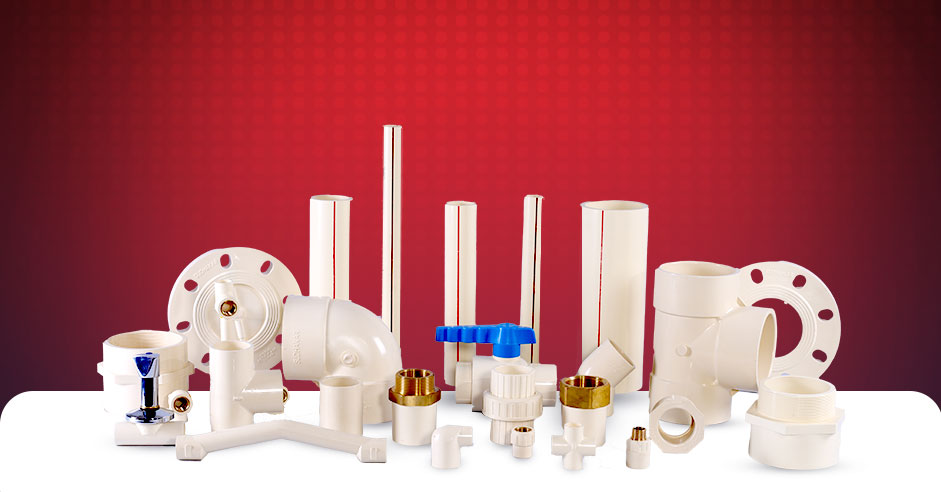When selecting the right type of pipe for your project, the decision between CPVC (Chlorinated Polyvinyl Chloride) and PVC (Polyvinyl Chloride) pipes can significantly influence the success and longevity of your system. Both types are highly regarded for their strength, resistance to corrosion and ease of installation, but they have distinct differences in their applications, temperature resistance, and cost.
In this blog, we will explore the key characteristics of CPVC and PVC pipes by Sudhakar Group, helping you determine which option is the most suitable for your next project. Understanding these differences can help you make an informed choice, ensuring your system performs optimally for years to come.
What Are CPVC and PVC Pipes?
● CPVC Pipes:
CPVC pipes are made by chlorinating PVC, which enhances their properties, especially in terms of temperature resistance. This makes CPVC pipes a preferred choice for carrying hot water and high-pressure applications. They are widely used in residential plumbing, industrial systems, and chemical processing plants.
● PVC Pipes:
PVC pipes, on the other hand, are made from unchlorinated PVC. They are durable, lightweight, and resistant to corrosion and chemicals, which makes them ideal for use in cold water systems, drainage systems, and sewage lines. PVC pipes are commonly used in homes, irrigation systems, and electrical conduits.
Key Differences Between CPVC and PVC Pipes
1. Temperature Resistance
One of the most notable differences between CPVC and PVC is their temperature resistance.
● CPVC pipes can handle higher temperatures up to 93°C, which makes them ideal for hot water applications, including plumbing systems in residential and commercial buildings.
● PVC pipes are designed for cold water systems and can handle temperatures up to 60°C. They are not suitable for hot water distribution systems as they may warp or degrade when exposed to high temperatures.
2. Durability and Strength
Both CPVC and PVC pipes are known for their durability, but CPVC pipes generally offer more resistance to certain harsh environments.
● PVC pipes are known for their durability and are often used in cold water, sewage, and drainage systems. They are highly resistant to corrosion but are not as resistant to high temperatures as CPVC.
● CPVC pipes offer higher strength and resistance to both temperature and pressure, making them more suitable for industrial and high-performance applications. They are ideal for use in water systems that require heat resistance.
3. Cost Differences
Cost is often a major factor when choosing the right material for your project.
● PVC pipes are more affordable compared to CPVC pipes. Their lower cost is one of the reasons they are widely used for residential plumbing and cold water systems. ● CPVC pipes are generally more expensive due to the additional chlorination process. However, their higher price is justified by their ability to withstand hot water temperatures and higher pressures, which makes them a better long-term investment for specific applications.
4. Ease of Installation
Both CPVC and PVC pipes are lightweight, making them easy to handle and install. However, there are some differences in installation processes:
● PVC pipes are easier to install because they do not require primer or special cement. You simply use PVC solvent cement to bond the pipes and fittings.
● CPVC pipes require the use of a primer and special cement to create a strong bond between the pipes and fittings. This makes the installation process slightly more complex compared to PVC.
5. Applications and Uses
Choosing between CPVC and PVC depends on the specific needs of your project:
● PVC pipes are commonly used for cold water systems, irrigation, drainage, and sewage systems. Their low cost and durability make them ideal for most residential and light commercial applications.
● CPVC pipes are typically used for hot water plumbing, industrial systems, and chemical processing applications. They are highly resistant to high temperatures, making them the go-to choice for systems that carry hot water or require resistance to pressure and high temperatures.
Which Pipe Is Right for Your Project?
Deciding between CPVC and PVC depends largely on the demands of your project:
● If your project involves hot water systems or industrial applications, CPVC is the better choice due to its temperature resistance and strength.
● If your project is limited to cold water systems, drainage, or irrigation, PVC pipes are a cost-effective, reliable solution.
It’s also essential to consider other factors, such as the longevity of the material, installation ease, and long-term maintenance, when making your decision.
Conclusion
Both CPVC and PVC pipes offer distinct advantages depending on your project’s needs. While PVC is a cost-effective and durable option for cold water systems, CPVC provides the superior performance required for hot water plumbing and high-temperature applications. By understanding the differences in temperature resistance, durability, cost, and ease of installation, you can make the right decision for your project. At Sudhakar Group, we offer a wide range of high-quality CPVC and PVC pipes, ensuring that you get the best product for your specific requirements. Contact us today for expert guidance and premium piping solutions.


